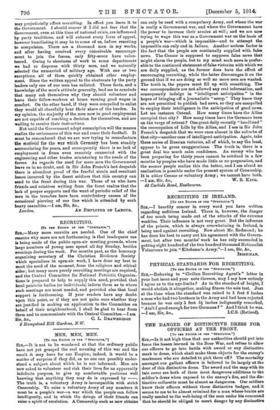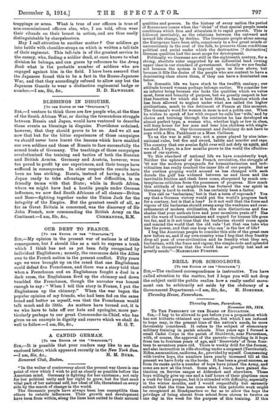THE DANGER OF DISTINCTIVE DRESS FOR OFFICERS AT THE FRONT.
[To TIM EDITOR OF TEE " SYRCTATOR.n SIn,—Is it not high time that our authorities should put into force the lesson learned in the Boer War, and refuse to allow our officers to go into battle with sword or any distinctive mark in dress, which shall make them objects for the enemy's marksmen who are detailed to pick them off ? The mortality amongst our gallant officers is believed to lie largely at the door of this distinctive dress. The sword and the map with its talc cover are both of them most dangerous additions to the soldier's dress when exposed to the enemy's fire, and the dis- tinctive collarette must be almost as dangerous. Our soldiers know their officers without these distinctive badges, and it seems to me to be almost criminal for a man whose brains are really needed to the well-being of the men under his command that he should be obliged to court danger by any distinctive
trappings or arms. What is true of our officers is true of non-commissioned officers also, who, I am told, often wear their ribands on their breast in action, and are thus easily distinguishable by sharpshooters.
May I call attention to another matter P Our soldiers go into battle with shoulder-straps on which is written a tell-tale of their regiment. This tell-tale is of the greatest service to the enemy, who, finding a soldier dead, at once knows to what division he belongs, and can guess by reference to the Army Book what is the probable number of soldiers who are engaged against him in the field. I have been assured that the Japanese found this to be a fact in the Russo-Japanese War, and that they accordingly refused to allow any but the Japanese Guards to wear a distinctive regimental badge or



























































 Previous page
Previous page